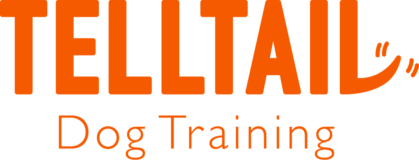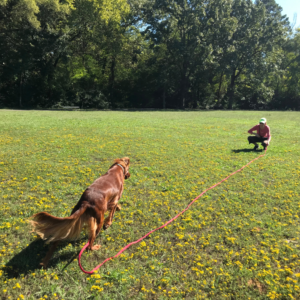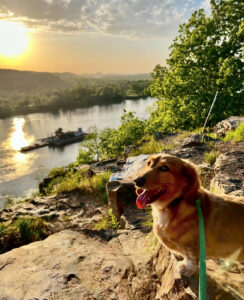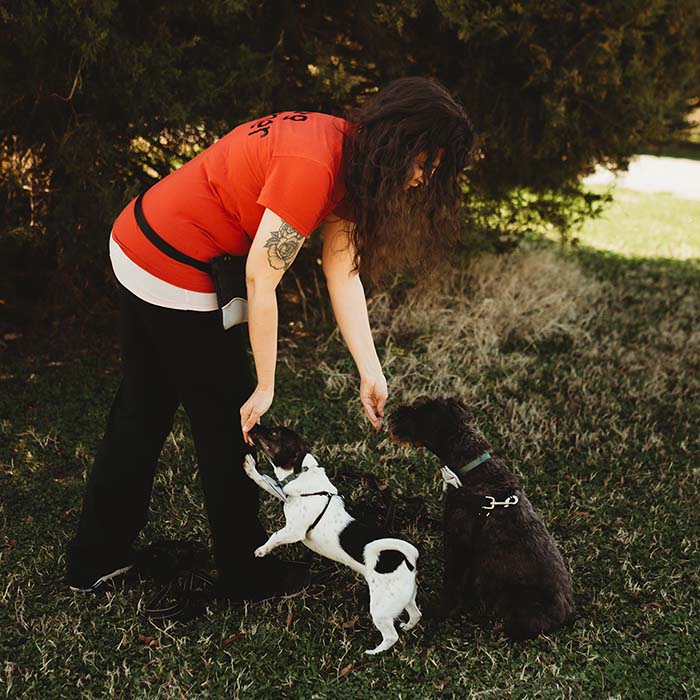“Knowledge is Key”: Starting a Dog Training Business and Discussing Pitbull Misconceptions with Masina Kakese
Podcast Transcript
[Intro]
Masina Kakese: So I got like second pick out of the litter, and I made sure that she was gonna fix them [Laughs] after that whole situation. She’s like, ‘Yeah, I’m not doing this again. That’s for sure.’ [Laughs] But they had, like, there were kids around, and they had a backyard, and they had a really good, good upbringing and I picked him because his eyes were furthest apart, [Laughs] and they were really cute. Just this little peanut head with like eyes on the side of his skull. [Laughs]
[Music]
Elizabeth Silversten: Hi, welcome back to Telltail Dog the Podcast. I’m your host, certified dog trainer, Elizabeth Silverstein, and I have with me today, Masina Kakese, owner of Q & A Dog Training, which is based out of Vancouver, Canada. Her previous experiences include working as a dog walker and as a doggy daycare attendant, and she’s currently enrolled in the Academy for Dog Trainers’ two-year program. Hi Masina, how are you?
Masina Kakese: I’m good. How are you?
Elizabeth: I’m doing alright. What’s the weather like up there? {Laughs]
Masina: It actually just started snowing. [Laughs]
Elizabeth: Oh, really? [Laughs]
Masina: Yeah, in Vancouver, it snows maybe like one week out of the year and then it stays maybe for like three days and it’s all just like slushy rain. So that’s what we’re dealing with right now.
Elizabeth: Okay, so you won’t have a white Christmas.
Masina: Probably not.
Elizabeth: Oh, okay.
Masina: Yeah. [Laughs]
Elizabeth: Well, I’m in Arkansas, so we probably won’t have one either. [Laughs]
Masina: Yeah. [Laughs] Thanks for having me.
Elizabeth: Yeah! Thanks for being willing to do this. I know that you, like me, you’re a little bit newer to owning a business and basically being in the industry, so I’m glad that you’re willing to do it, and have the conversation with me. I think it’s helpful for people.
Masina: I think so. I kind of wish I had that. Like, there’s resources but they’re kind of tricky to find, and currently I’m in the Mentorship Collective by Bravo Dog and that’s been really helpful just having like a, you know, people to fall back onto and also know that people are going through the same ups and downs as me. [Laughs] And owning a business is hard but it’s worth it, and I wouldn’t want to be doing anything else at the moment.
Elizabeth: Well, what, first, got you started and interested in dogs, or maybe animals, if dogs weren’t the first animal that you fell in love with?
Masina: Dogs were. I grew up having pugs. My grandparents raised me and they had about three pugs before I was born and then we had two when I was little, so I loved pugs and I would like train them, air quotes. [Laughs] And I grew up with chickens and just like 15 cats running around on like three acres of land. So I love animals and, you know, I have always been interested in just how dogs learn and behavior, and after not going into makeup and fashion, all of that, then I was like, oh I’m gonna walk dogs, and so I found a great company here in Vancouver and I was working with them for about four years, and there was only so far I could go in that company with walking dogs, so I decided that I wanted to go to school and learn more and help humans understand their dogs better. And it’s an ongoing journey of there’s just so much so much for us to learn and to pick through the right courses, as well. So it takes time and I’ve learned to just kind of slow down and be on my own journey and try not to hear the outside noises of other people and where they’re at. And did that answer your question?
Elizabeth: Yeah! No, it did. Yeah, because we have some parallels in our journeys because I started off as a dog walker, worked at a doggie daycare. I don’t think I did the doggy daycare as long as you did and then –
Masina: I didn’t do it for that long.
Elizabeth: Oh, okay.
Masina: It was like six months or something. It was a wild one. [Laughs]
Elizabeth: Yeah. Yes. I hear you. And I’m curious to see if this has been your experience, so I had people with some perceptions of me working at a doggy daycare, and then some perceptions people had of me as a dog walker, including one that’s pretty persistent when people are like, my dog doesn’t walk on a leash, and they’re kind of polling the social media world for advice on that, people are like, oh your dog walker should be able to do that, and there’s really a disconnect there and a misunderstanding of what dog walkers do and what trainers do and the skill level. Because for dog walking, and I think a lot of dog walkers really care and love animals, but they don’t have, unless they’ve had some previous experience, to be a dog walker, you don’t have any training to walk dogs.
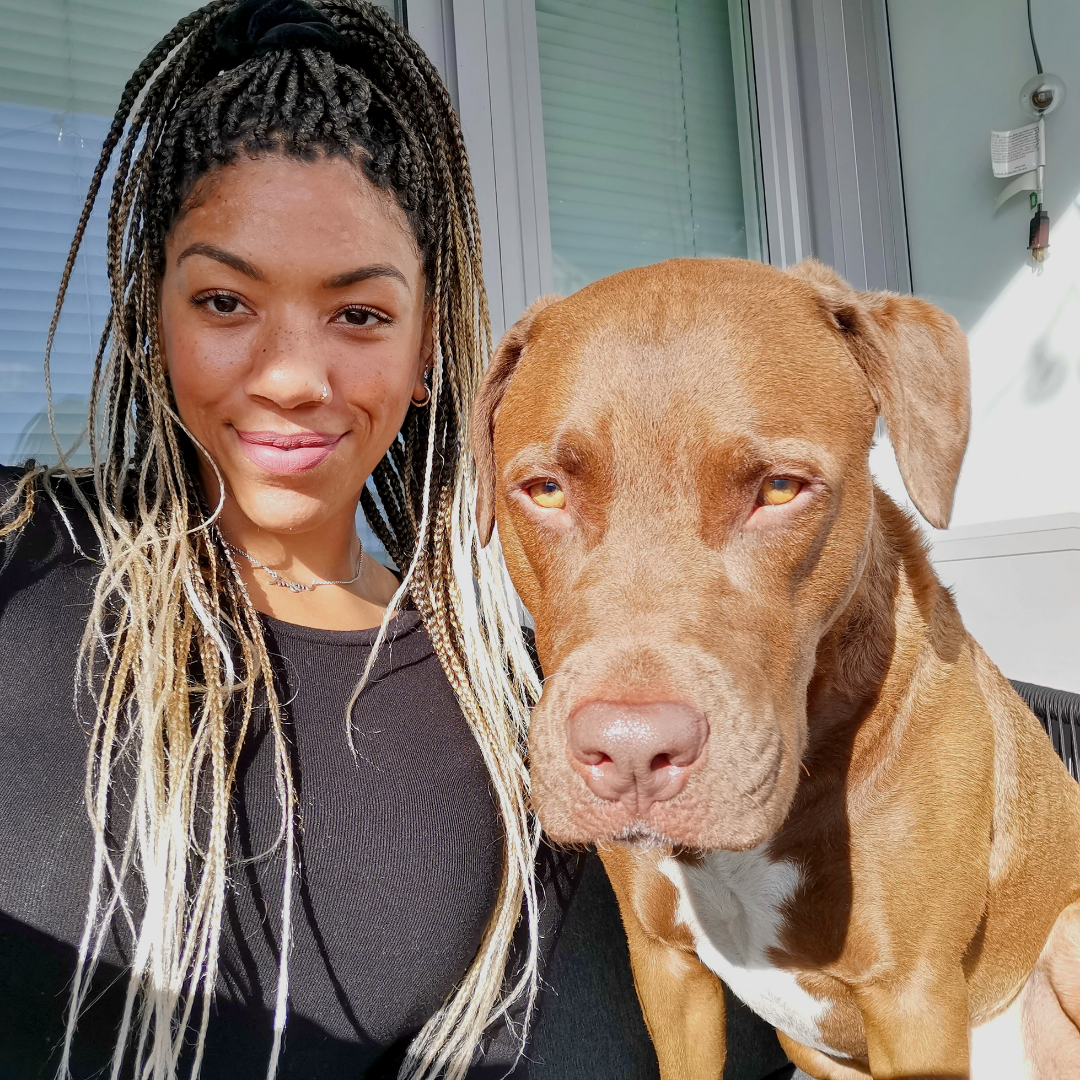
Masina: Yeah, very true. And I, being a dog walker for so long, I think that everyone should do some kind of mini course. There’s no like–it’s like, oh you like dogs? You have some weight on you? You can manage six leashes at a time? Cool, like, let’s throw you in, kind of. So yeah, I think there should be some kind of structure around that for dog walkers where they get some training and yeah, there’s differences and there were a lot of times as a dog walker, people were like, oh can you like train my dog? I’m like, I’m not qualified to do that. I don’t know. This was before I went to school.
Elizabeth: What made you–so what was that turning point for you, when you’re like, I want to continue with this and find a school? What was that journey for you?
Masina: I was walking for four plus-ish years and it was hard on my body, first of all. I was kind of just burnt out. And the main reason was, there’s just a lot of driving. We’re not walking the whole time. We’re driving a lot. So there’s that, but also just wanting to–like, seeing all these different dogs with obviously different personalities coming in and different issues as well, and I just wanted to learn more about how to help these dogs and their certain areas. So I found a school located in Vancouver. Force-free, awesome. Just a shorter, half-year course. And that was a good foundation to kind of start for me and then I kind of went back to dog walking and then I decided, right when the pandemic hit, to quit and open up my own business. So it’s been a year now and it’s been definitely some–some flows. Some good. There’s a lot more to do and a lot more to learn, but I’m feeling pretty grounded and secure and motivated and also ready for this holiday break [Laughs] to kind of recharge and focus again, but yeah, at the end of January, then I officially start at the Academy for Dog Trainers, which is pretty exciting. I got offered the BIPOC scholarship that they put out a couple months ago, so that’s gonna be a journey in itself but I’m extremely excited to just dive a lot deeper and just really soak it all in.
Elizabeth: So I know from experience, it’s very, very challenging to not only find a dog trainer position but find a dog trainer position with someone that has methods that you want to learn from. Was that the driving force behind starting your own business or what was that transition there from like dog walker to my own thing, which is–it’s a lot to start a business.
Masina: It is a lot. I kind of was also at the point that I was just over working for anybody and I reached out here and there for kind of mentorships but it didn’t really pan out. So yeah. And I, kind of, after school, I knew that I didn’t want to work for anybody. I was like, I want to be my own boss and I’m gonna do it and here we are. [Laughs] Yeah, I think just running my own show was a big driving force for that.
Elizabeth: And everybody does everything differently, which is why it’s really interesting. It’s not regulated in the United States and it sounds like Canada has no regulation, either.
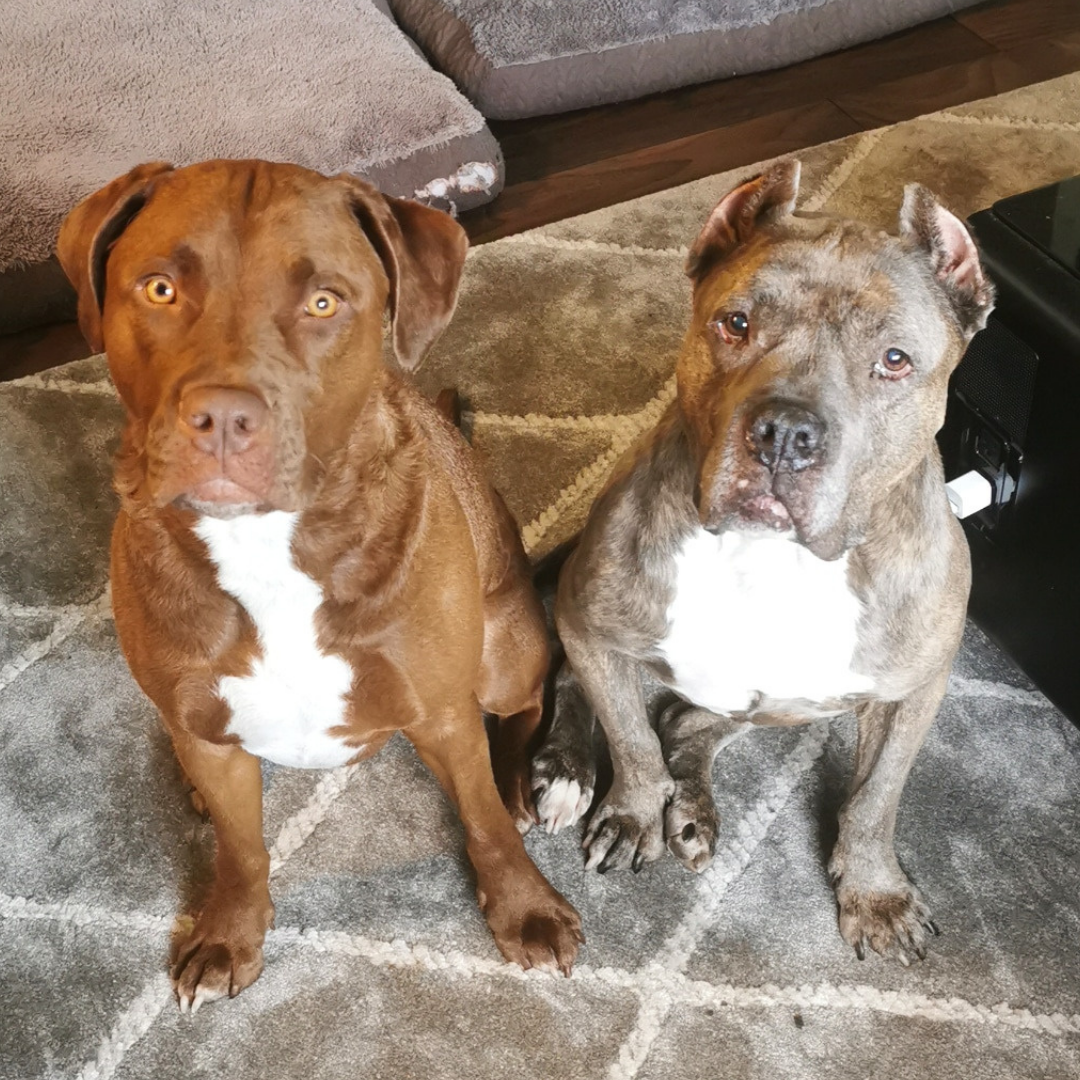
Masina: No. No, it is not. It is a very interesting industry that I’ve gotten myself into. [Laughs]
Elizabeth: Yup. Yes. [Laughs]
Masina: It’s really rewarding and I do love it and there’s nothing else I want to be doing right now in this moment in my life, but it’s just–there’s a lot. There’s a lot. And I don’t really know too much about the balanced world and that side. I just kind of, you know, I don’t really know anyone in that world, but I find it wild that we spend so much of our money on the actual science-based education and our courses and, you know, conferences and all that, and, sometimes, we are struggling with marketing ourselves and I have no marketing background, like that’s been a real thing, but referrals have been picking up and that’s a lot of word-of-mouth, which is great, but then there’s like the other side of the balanced world, I think they spend all their money on marketing and that’s how they kind of reel their clients in, so it can be hard, like, we’re us against them in a sense. I feel like that.
Elizabeth: Yeah, I think so. I see it a lot here. And it’s very, very interesting. The way I look at it is, if people don’t want me to help them, I can’t help them, but if people are open to it, I’m happy to have a conversation and to provide information. I’m trying to be the trainer that young Elizabeth could have used, is how I look at it, and if that resonates with people, great, but a large part of what I do is just trying to figure out what would have made young Elizabeth really excited to see and learn and how can I offer that to people? I’m still figuring out how to interact with all of that world and what my place is in it and where to take feelings if a big feeling happens because it does feel really overwhelming to wake up and realize I’m kind of in a marketing methods war, and I don’t want to be here, but I don’t have any choice but to be here.
Masina: Mm-hmm, yeah. I also, like, this industry doesn’t have a lot of people of color and I’m pretty sure I’m the only Black dog trainer in Vancouver so I, you know, I’d like to–I’d like other young people of color to see me and be like, ‘Okay, sweet. Like, she can do it, I can do it,’ I’m still figuring out how to do it, [Laughs] but I’d like to be that representation.
Elizabeth: I think that’s amazing and yeah, absolutely needed. There’s a lot of elements, too because we talked about methods, but there’s also a lot of sexism and racism in our industry and there are–I mean, I get comments just from random people on the street when I’m doing a training walk, where they’re like, ‘Who’s walking who?’ and I’m like, ‘I’m obviously walking the dog. Your point?’ So it can become a big–it can feel really overwhelming. and I can only imagine, you know, the extra part of that being a person of color of what you have to deal with. So not only being a woman but having to deal with a lot of racism.
Masina: Yeah. And my Q, he’s a pitbull-black lab and there’s been numerous comments where I’m just walking my dog, and like there will be, you know, like, ‘Oh your dog even acts Black.’ It’s like, what does that even mean? Or like, ‘Oh, is your dog as mean looking as you?’ Like, ‘I’m sorry, I’m just minding my own business, about to walk across the street. Don’t touch my dog.’ Then they come in to touch my dog. That’s like, ‘What are you–ah!’ [Laughs] Yeah there’s–it’s– mean, Vancouver is obviously Canada. We definitely have issues with racism, deep rooted on a different, in a sense, than America. It’s maybe not as in your face here, but it’s here. Lots of microaggression and, you know, I live in a predominantly white city, like a predominantly white neighborhood, so it can feel like, I’m, you know, the black sheep a lot of the time. [Laughs] No pun intended. [Laughs] Yeah.
Elizabeth: How do you take that and, kind of, in dealing with the reality of your situation and bring that to your business? Are there certain policies that you have? Are there certain ways you interact with people? Have you found that it’s impacted your business?
Masina: I don’t find like it’s impacted my business negatively. I’m also still trying to kind of find my niche market, which has been a little bit difficult. Just finding the people that are obviously–we all as trainers all want people to do the things. [Laughs] It’s a lot easier said, but yeah also, I, myself–like, I’m a pretty outgoing personal person, so to find people that I also vibe with, if that makes sense. You know, I’m slowly getting there. I’m finding more of those people, because referrals and, you know, one person that I work with that’s awesome, then they refer their friend and so on and so on, the ripple effect.
Elizabeth: How did you land so firmly on, you know, welfare-based, fear-free?
Masina: Yeah, that’s a good question. There was no question, really. It was just like, that’s the way I’m gonna do it. There’s no room for any kind of physical or punishment or anything like that and, you know, growing up just with animals and dogs, and it was always, I don’t know, there was just no question to go that way. Like prong callers, shock collars, that kind of whole thing scares me, and any time I see any kind of anything before, being a dog walker, any kind of leash jerks or anything that puts any kind of strain on an animal, like I’m just super appalled and I’m not–yeah, there was just no question on that. It was like, I’m doing it force-free. Like, that’s for me personally. And I mean–that’s not to say like what like, I will admit, I did do an alpha role once with a–which breaks my heart–but with a dog that I fostered. And silly me brought him into the dog park and a thing happened and then I alpha rolled him and then we left. And I look back at that like, what. Like that’s just–there’s still so much action going around while this poor dog is on its side, then you’re like, you must chill. So I’m not perfect.
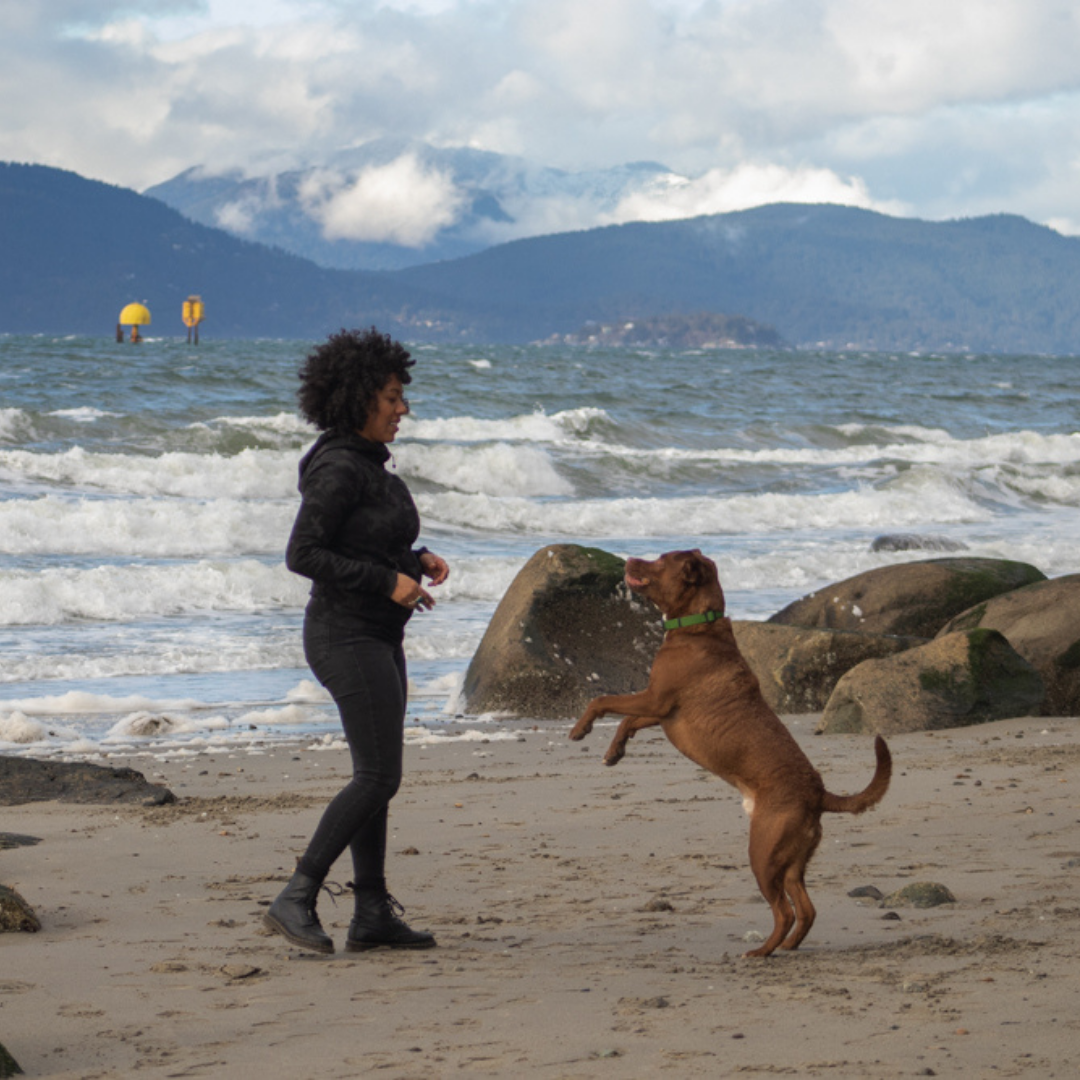
Elizabeth: I think sometimes when we’re striving to be a voice in an industry, and we’re seeing all that goes wrong and how people do things, it can be very tempting to be hard on yourself for the mistakes you made, but making mistakes is human. It’s very, very human and I still think about a lesson from like, I think it was a lesson in 2019, where I set the dog up for failure, and it did result in the bite of a child, and it’s one of the things that I will never forget. And the child’s fine. It didn’t break the skin, but it never should have happened. It just never should have happened. And I’ll always think about those mistakes, and how that just changed all of my policies and how much I’m just unapologetic in a lot of things now, and I’m not gonna put anybody, the dog or another person, at risk ever again. So those things happen and I think in our field, we’re going to be harder on ourselves than anybody else. But I don’t think that’s what we’re talking about. We’re not talking about mistakes or mess-ups or, you know, hard lessons. We’re talking about like the big differences is like someone’s muscling a dog or forcing a dog to do what they want the dog to do in a way that’s not even just starting with some basic communication and understanding. I feel like those are the those are completely separate things. But I don’t think there’s any trainers who do what we do that’s like, I never make mistakes.
Masina: I mean, we learn from our mistakes.
Elizabeth: Yes. I just interviewed Karen London last week, and I brought this up with her, too. Chirag Patel just posted a video on his Instagram of walking into a thorn bush. [Laughs] I’m not laughing at him being in pain or making the mistake, but it’s just so delightful to me that he would reveal it and show it and just show the humanity behind it. We are in a field where it’s very cult-like. It’s very spiritual. There are people who set themselves up for a cult of personality and I think the best thing that we can do is continue to humanize ourselves as experts in our field and to be honest about the mistakes. So Chirag Patel is a greatly accomplished person who’s done a lot for our industry. He speaks at conferences. He’s wonderful and he still was like, ‘Here’s a little booboo I did.’ And it’s okay.
Masina: Yeah no, I love seeing that too, where you’re just honest. You’re like, well I–that or like, the dog didn’t do it, so we’re just gonna like reset and you know, it’s not–no one’s perfect and everyone’s learning so.
Elizabeth: Yes. Yeah, and we’re all pretty much growing together and that’s a big thing. I did a whole series on Embarrassment for my content, because I want–when dog owners come to me, I don’t want them to be afraid that I’m going to be like, how dare you do this. It’s like, oh, let’s get started on that journey together.
Masina: Yep, totally.
Elizabeth: And you mentioned your pup, and his name was Q, is that right?
Masina: Yes, he’s almost five. He’ll be five in July. Yeah, he gets mistaken sometimes for a chocolate lab or a Chesapeake because he kind of has the curly, a little bit wavier fur. But yeah, he’s a black lab pitty red nose, and he’s awesome. I got him from Port Alberni when he was about eight weeks old.
Elizabeth: Okay, so you’ve had him for a while.
Masina: Yeah. Yeah, Q and I have gone some shit together.
Elizabeth: Yes, my Schnauzer, my miniature Schnauzer, is nine. He’s going to be 10 next year and same, yeah, lots of informative years together.
Masina: Yeah, definitely they’re our little therapy dogs.
Elizabeth: Yup. Yeah. What made you pick him? How’d you find him?
Masina: I actually put a blast out on Facebook just saying, is there anyone that knows any pit mix puppies and an acquaintance of mine, she’s like, ‘Oh yeah, I actually have a friend who just so happens to have two dogs.’ And they were both young and not fixed and accidentally got together and had a litter. So I got like second pick out of the litter and I made sure that she was gonna fix them after that whole situation. She’s like, ‘Yeah, I’m not doing this again, that’s for sure.’ [Laughs] But they had there were kids around, and they had a backyard, and they had a really good upbringing. And I picked him because his eyes were furthest apart and they were really cute. Just this little peanut head with like eyes on the side of his skull [Laughs].
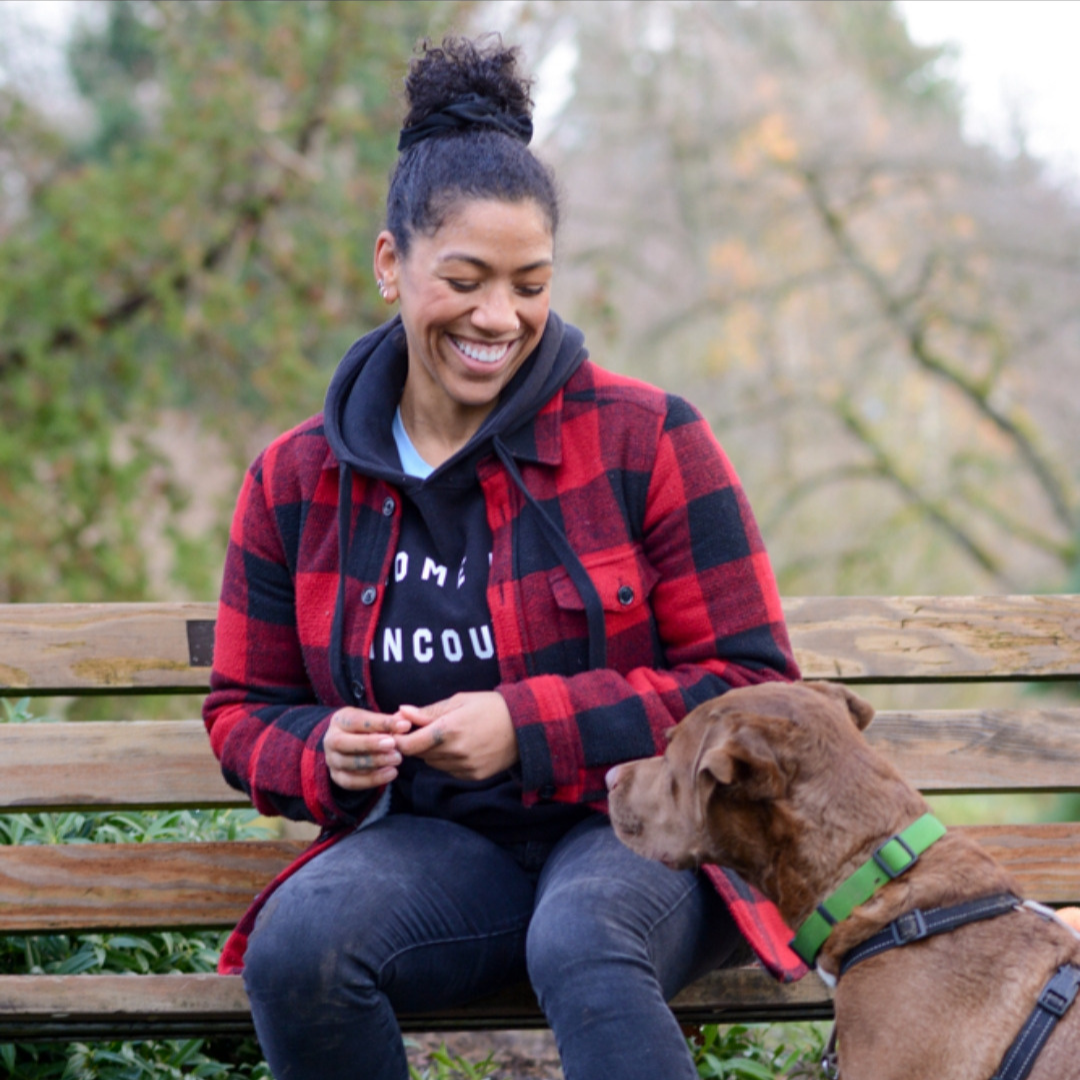
Elizabeth: So you were intentionally looking for pit mixes. What was the decision behind that?
Masina: I have always loved pitbull-type dogs. I just find them super loving and goofy and then also I fostered this staffy for a few months way back when before Q, and he was so great. Just not for me. Not an apartment dog. So I found him a really loving family, but he kind of, I think, set the ground to like solidify. I was like, ‘All right. I want one of you guys.’ And they, you know, they have such a horrible, horrible rap. There’s quite a few pitbulls in Vancouver, but there’s still, you know, certain apartment buildings and stuff that don’t allow them. And there’s obviously people out there that can be quite rude and, just by the look of your dog, call your dog aggressive. But yeah. They’re my breed. [Laughs]
Elizabeth: So what are some of the misconceptions that you feel are happening about pitbulls?
Masina: That they are all bred to attack. [Laughs] For instance, a family member, I told him that I have a pitbull mix, and he was like, ‘Oh, like he’s going to attack you one day.’ I’m like, ‘What? No.’ Yeah. And just even like Q, he can be very vocal when he plays and he’s a sweet, sweet guy, but yeah, just vocal like a dog, and there’s people that come up to me with their small dog and they’re holding their small dog, and they just look at me and they’re like, ‘Your dog is really aggressive.’ And I’m like, ‘Okay, first of all, don’t throw that word around.’
Elizabeth: Yeah, it’s serious.
Masina: And even when clients are like, ‘Oh he has, like he’s being aggressive,’ and I’m like, ‘Let’s rewind for a second.’ You know, language, of course, in our industry, really matters. So aggressive and reactive are a little bit different. So yeah. Saying that someone or someone’s dog is aggressive has a lot of weight. Also like, I’ve been told that a few times with this guy and it hurts and it’s heavy. And it’s like, ‘Oh.’ and then you’re like, ‘Is my dog aggressive?’ I know he’s not aggressive, but you know for dog owners out there that hear that time and time again and they’re really working hard and they’re struggling and then people, you know, are just out of nowhere, because their dog is being a dog, say something and that can really get you. Really hurt you.
Elizabeth: Yeah I was–when I first moved here and I realized that breed specific legislation was happening here and I learned more about it, I was shocked because maybe a full quarter of the dogs I worked with on the farm where I learned how to train were pitbulls and never, none of them had any inclination towards attacking people. The dogs I thought were going to bite me on that farm were like, hounds. Were herding dogs. I was like, but I understand the fears that people have and that’s why education is so important to me, because I’m like, ‘Well, let’s talk about it and get you information that’s scientifically backed and factual.’ Because confirmation bias is such a huge aspect of our field and people say, ‘Well, I saw this and this was my fear, so therefore it means this.’ And it’s actually completely opposite.
Masina: Yeah. Yeah. And the problem, I guess, with just the internet and so much information and Youtube and, like, I’m sure you get this, too, but countless times you have, we, I have clients say, ‘So I was doing, you know, trying to look at all the videos on Youtube, but then I just finally decided to reach out to you or reach out to a positive or fear-free trainer.’ It’s like, ‘Thank you, great. Let’s not go on Google anymore. I’ll just send you all the resources.’
Elizabeth: Yes, 100. And I’ll use that as a joke to break the ice because I’m like, it’s a nightmare on the internet, and they’re like, yeah.
Masina: There’s a lot of different takeaways and a lot of them aren’t the best.
Elizabeth: Yes. Yeah. Because it goes back to your original point you mentioned, like certain people having such a huge budget and with that budget, you can get the best SEO. You can get your ranking up high. You can get all these views on YouTube. Whereas the stuff that is actually helpful to people gets super buried or you’re not sure how to find it. A lot of times, I’ll throw certification letters behind what I’m googling so that I can find an author with that certification and the common dog owner wouldn’t even know how to do that or where to start.
Masina: Yeah and then like, of course, the certification world and that’s a whole other conversation. I think it gets with certifications there’s a lot of people just don’t look for them and know to look for them and then that’s where the old school balanced trainers come in. They’re like, ‘Oh, here this is my beautiful marketing,’ and they may call themselves positive reinforcement, but then they also might slap on a choke chain.
Elizabeth: Yeah. There’s so much nuance in our industry and then as you’ve probably been seeing, there’s a lot of conversations happening around licensing and certification at the moment and, you know, trying to have those conversations about, you know, who’s gatekeeping.
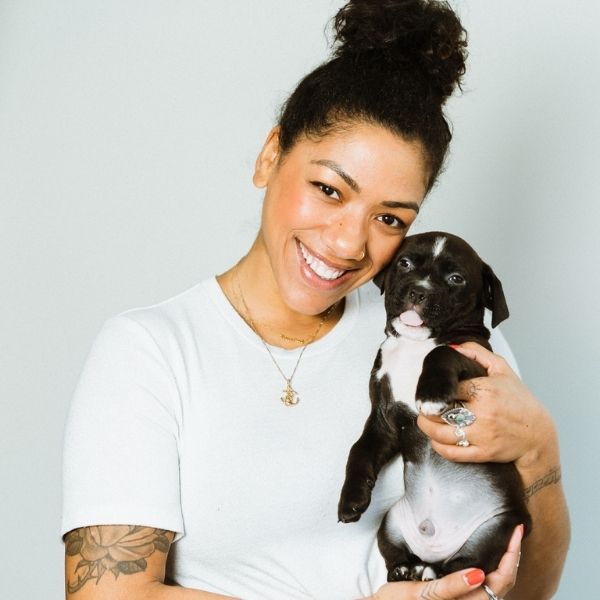
Masina: There is a lot of, like, don’t do this, don’t use that, blah blah blah. Cool. But we were talking about, like, let’s maybe [say] what should people do and not so much highlight what not to do. Let’s highlight what to do what to use where to go search for certain things. Yeah. And social media, man. But I’ve just–it’s a whole other factor with the business. And I think that that is a big–that’s what’s probably burning me out. Like I’m not there, and I’m making sure that that doesn’t like happen, but I’ve definitely–I’ve taken a step back from Instagram. Instagram’s my main platform. I’ve just–yeah, I’ve just kind of taken a step back with constantly having something to post. It just feels like, I don’t know. Like, I’m still doing my work. I’m still–I’m still here. I just might not be posting it on social media. So I don’t know. Yeah, Instagram’s been a little bit funny for me. I took a step back and I do feel better because of it. I’m just not so focused and like, ‘Oh, I gotta figure out something to post in the next couple days.’
Elizabeth: Yeah. How are you sorting through what you feel your responsibilities are as an educator and dog trainer in your area?
Masina: I’m just trying to like get as many resources under my belt and information and articles that I can send to my clients, along with everything else that I’m coaching them on. That’s kind of where I’m at, at the moment. I’m kind of just, yeah, focusing on the clients that I have at the moment. And, you know, I’m, of course, trying to spread the word of force-free whenever I can but I’m not like actively doing, I don’t know, certain things if that makes sense.
Elizabeth: It does, yeah. Well, it was really wonderful talking with you, Masina. Was there anything else that you wanted to add?
Masina: I don’t think so. This was great. This is my first podcast, so I would love to be back one day. [Laughs]
Elizabeth: Yes! And let me if there’s things–so what I try to do is look for things in your social media, and if you’ve kind of taken a step back from social media, I can’t get my finger on the pulse of that, but if there’s things that you’re passionate about, and you really want to delve into, you can always let me know. I’d love to have you back on. It was great, you know, discussing pitties with you and your experience there, so if there’s anything else that you’re like, let’s dissect that, I would be happy to do that, so maybe that’s tools or training methods or what have you.
Masina: Sweet.
Elizabeth: Masina, where can people find you if they’re looking for more of your content?
Masina: You can find me at www.qandadogtraining.com and my Instagram is Q.A.DogTraining.
Website: https://www.qandadogtraining.com/
Instagram: https://www.instagram.com/q.a.dogtraining/
Elizabeth: All right, I’m going to do this sign off, and then at the very end, I’ve got one final question for you. This has been Telltail Dog the podcast with your host, Elizabeth Silverstein, that’s me, certified dog trainer in central Arkansas, and my guest today, Masina Kakese, the owner of Q & A Dog Training. Music has been provided by Jim Ciago of Seven Second Chance. Find more of his work on iTunes and Spotify, and stick around after the music for some final advice from Masina.
[Music]
Elizabeth: Masina, before we sign off completely, I know we touched on a lot of different things when it comes to our industry, and being a dog trainer, but if there’s someone out there listening and trying to figure out if they want to become a dog trainer, what advice do you have for them?
Masina: Do your thorough research on all the course options that are out there and schools and really figure out which one you want to put your money and time into and start there. Get a base foundation and work your way out and if you have opportunities to take care of friends and family’s dogs, do it. Just immerse yourself in the dog world the best you can in your city or in your town. But education and knowledge is key, so that comes first.
